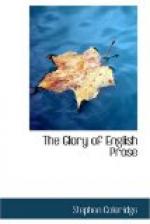Such a writer to-day would blow a wholesome wind across the tainted pools of political intrigue.
We can salute him, Antony, as a fine, manly, clean writer, who was an honour to letters.
Your loving old
G.P.
15
MY DEAR ANTONY,
Born in the same year as was Grattan, namely, in 1750, Lord Erskine adorned the profession of the Bar with an eloquence that never exhibited the slight tendency to be ponderous which sometimes was displayed by his contemporaries.
Grace and refinement shine out in every one of his great speeches.
He was a young scion of the great house of Buchan, being the third son of the tenth Earl. After being in the Navy for four years he left it for the Army, and six years later he went to Trinity College, Cambridge, and took his degree; thence he came to the Bar in 1778, and at once displayed the most conspicuous ability as an advocate.
He appeared for Horne Tooke in a six-day trial for high treason, which ended in an acquittal.
In 1806 he became Lord Chancellor and a peer.
I quote an indignant warning to the aristocracy of England which flamed forth in one of his great speeches:—
“Let the aristocracy of England, which trembles so much for itself, take heed to its own security; let the nobles of England, if they mean to preserve that pre-eminence which, in some shape or other, must exist in every social community, take care to support it by aiming at that which is creative, and alone creative, of real superiority. Instead of matching themselves to supply wealth, to be again idly squandered in debauching excesses, or to round the quarters of a family shield; instead of continuing their names and honours in cold and alienated embraces, amidst the enervating rounds of shallow dissipation, let them live as their fathers of old lived before them; let them marry as affection and prudence lead the way, and, in the ardours of mutual love, and in the simplicities of rural life, let them lay the foundation of a vigorous race of men, firm in their bodies, and moral from early habits; and, instead of wasting their fortunes and their strength in the tasteless circles of debauchery, let them light up their magnificent and hospital halls to the gentry and peasantry of the country, extending the consolations of wealth and influence to the poor. Let them but do this,—and instead of those dangerous and distracted divisions between the different ranks of life, and those jealousies of the multitude so often blindly painted as big with destruction, we should see our country as one large and harmonious family, which can never be accomplished amidst vice and corruption, by wars and treaties, by informations, ex officio for libels, or by any of the tricks and artifices of the State.”
Mr. Erskine was entitled, as the son of the tenth Earl of Buchan, to speak such words of warning and exhortation to the aristocracy of England to which he belonged, and the lapse of a century and a quarter has not rendered the exhortation vain, though it may be hoped that the condemnatory clauses of the speech would not at the present time be so well justified as when they were delivered.




